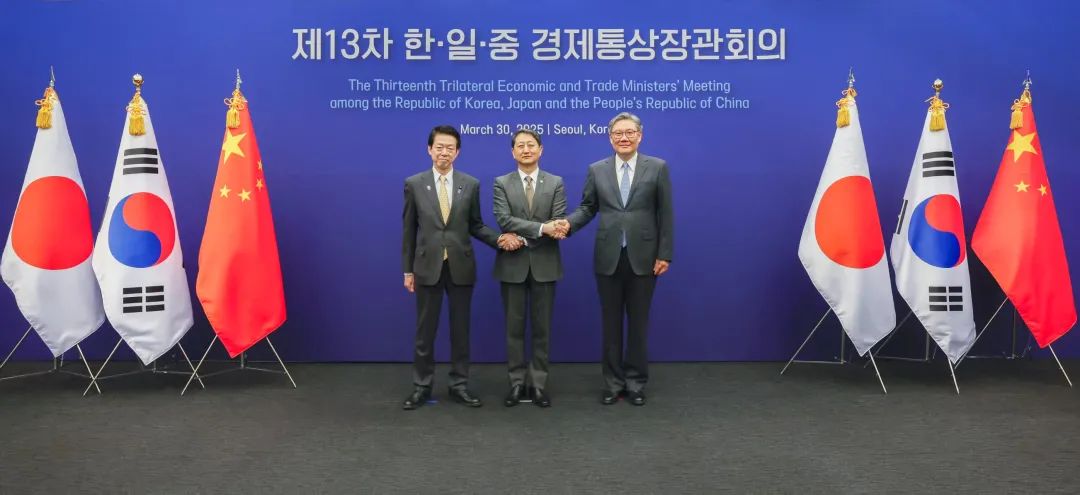
On March 30, the China-Japan-South Korea Economic and Trade Ministers' Meeting was held in South Korea. Lord Tan learned that the atmosphere of this meeting was good, and Japan and South Korea attached great importance to this meeting, and everyone said they hoped to cooperate.

On some specific issues that we are concerned about:
The tripartites agreed to strengthen supply chain cooperation and export control dialogue. Mr. Tan learned that Japan and South Korea hope to import some semiconductor raw materials from us, and we also hope to import Japanese and Korean chip products. China, Japan and South Korea have a consensus that they hope to keep supply chains open in these areas.
The meeting discussed accelerating negotiations on the China-Japan-South Korea Free Trade Agreement. Mr. Tan learned that the China-Japan-South Korea Free Trade Agreement will be further opened on the basis of RCEP.

This meeting is the highest level of communication between China, Japan and South Korea's economic and trade levels, and is also the second time the China, Japan and South Korea's economic and trade ministers' meeting was held again after more than five years.
Although it was a restart, the three parties did not spend a lot of time on procedural greetings, but talked about many substantive issues.
On April 2, the US government will soon announce new "reciprocal" tariffs. According to the information previously released, China, Japan and South Korea are both target countries.
At the same time, the US government also mentioned that in addition to "peer-to-peer" tariffs, tariffs on specific industries such as semiconductors will be announced.
Correspondingly, the meeting between China, Japan and South Korea focused on maintaining the stability and smoothness of the industrial chain and supply chain, strengthening cooperation in regions and multilateral frameworks such as WTO, RCEP, APEC, etc., which is very targeted.
The meeting also mentioned accelerating negotiations on the China-Japan-South Korea Free Trade Agreement.
Under the framework of RCEP, 86% to 88% of goods between China and Japan will achieve "zero tariffs", and 83% of goods between Japan and South Korea will achieve "zero tariffs". If a free trade zone is established, the tariff preferential treatment and the scope of the goods involved will be further expanded.
Some China, Japan and South Korea have faced differences in the past, and this time it also involves semiconductors.
In addition to the trilateral meeting, China, South Korea, China, Japan and South Korea also held bilateral meetings respectively.
Among them, bilateral meetings between China, South Korea and Japan and South Korea all mentioned cooperation in key mineral supply chains.
China and Japan also communicated on semiconductor-related issues.

Combining these backgrounds, Tan Zhu believes that this meeting sent two signals:
First, strengthening cooperation with trading partners is the current method to hedge against the impact of US tariffs.
Some Japanese and Korean semiconductor companies have faced operational difficulties recently.
In 2024, against the backdrop of a 18.1% increase in global semiconductor industry revenue, Samsung's foundry business sales were declining year-on-year. Not long ago, Samsung Electronics President Lee Jae-yong said that Samsung is at a critical moment of life and death.
If Trump’s tariff policy is introduced, it will further undermine the global semiconductor industry chain and supply chain.
Histor Tan learned that Japan and South Korea hope to import some semiconductor raw materials from us, and we also hope to import Japanese and Korean chip products. China, Japan and South Korea have a consensus that they hope to keep supply chains open in these areas.
Second, maintaining communication can become an effective means to combat trade uncertainty.
Histor Tan learned that during the meeting, China repeatedly expressed a meaning that trade differences are not scary. The key is to establish a smooth communication mechanism for differences. When encountering problems, everyone should communicate and resolve the problems in a timely manner.
There are mechanisms such as production and supply chain cooperation hotlines and export control dialogues between China and South Korea.
There are mechanisms such as export control dialogues between China and Japan.
For Japan, which currently has more distinctions with us, the fourth meeting of the China-Japan Export Control Dialogue Mechanism was held in Beijing on March 27.
Master Tan noticed that the main content of this dialogue was to introduce the export control system of the two countries to the other party and related companies.
Being well-disclosed policies can help companies resist risks. Such demonstrations are particularly meaningful at the moment - considering the current tariff measures in the United States, it has a main feature, which is to create panic in the market through policy threats, but in fact, the United States has not introduced specific measures for a long time.
On this basis, China, Japan and South Korea can reach a broad consensus, which further proves that bilateral differences are not a reason to hinder the multilateral trading system. Major countries should consider the overall situation of global trade and jointly maintain the global free trade system.
The practices of China, Japan and South Korea can form a positive reference for many regions and even important economies in the world.
The Lord Tan learned that China, Japan and South Korea should use certainty to hedge the uncertainty brought to global trade by the United States' infringement of "reciprocal" tariffs and other actions, which are clear to all three parties.
As US tariffs get closer, more countries should play an active role, take the initiative to assume responsibility, and inject more confidence and impetus into the stability of the global economy.